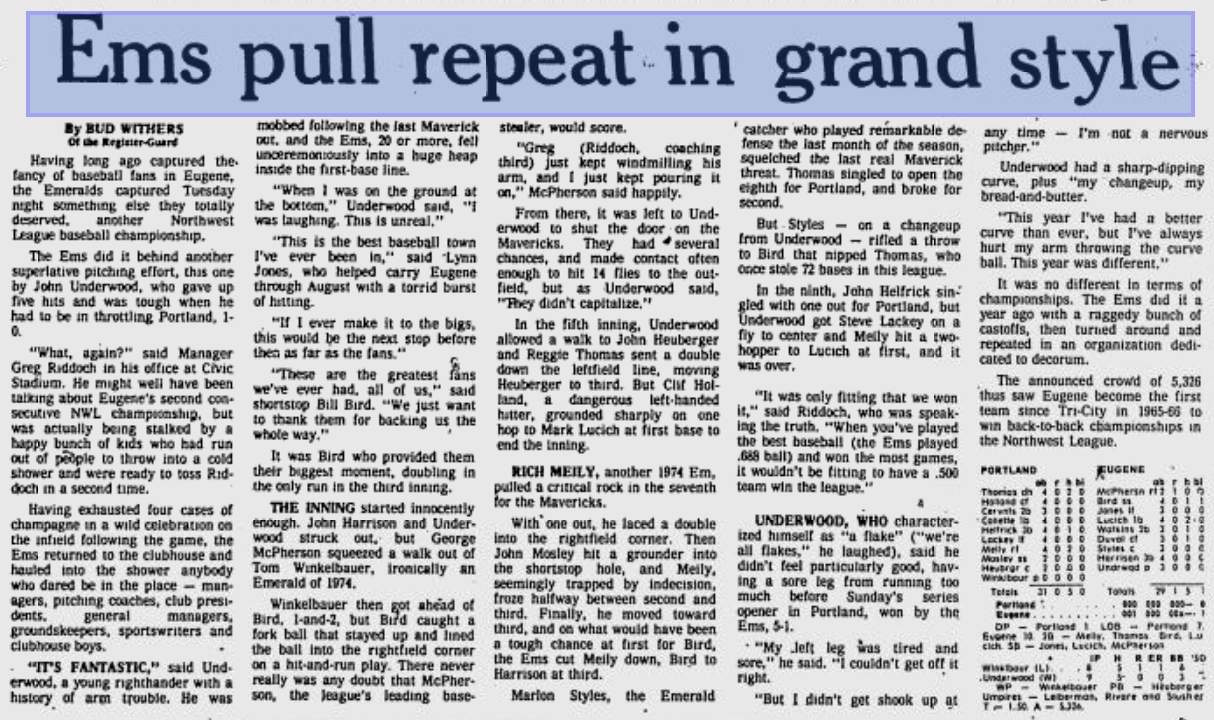Pitcher John Underwood was drafted by the Reds in the 22nd round in June 1973. He was part of the 1975 Eugene Emeralds — the Little Red Wagon — that won the Northwest League championship. John pitched a 1-0 complete-game shutout in the final game as Eugene swept the Portland Mavericks 2-0. It was a highlight in a career that was marred by serious arm problems and which ended after four seasons.
Excerpted from my book The Little Red Wagon: The 1975 Eugene Emeralds.
Jim Haught You had basically four seasons as a pitcher in pro ball, and you must have been drafted right out of high school, right?
John Underwood Correct. I was drafted in the 22nd round in 1973, out of high school.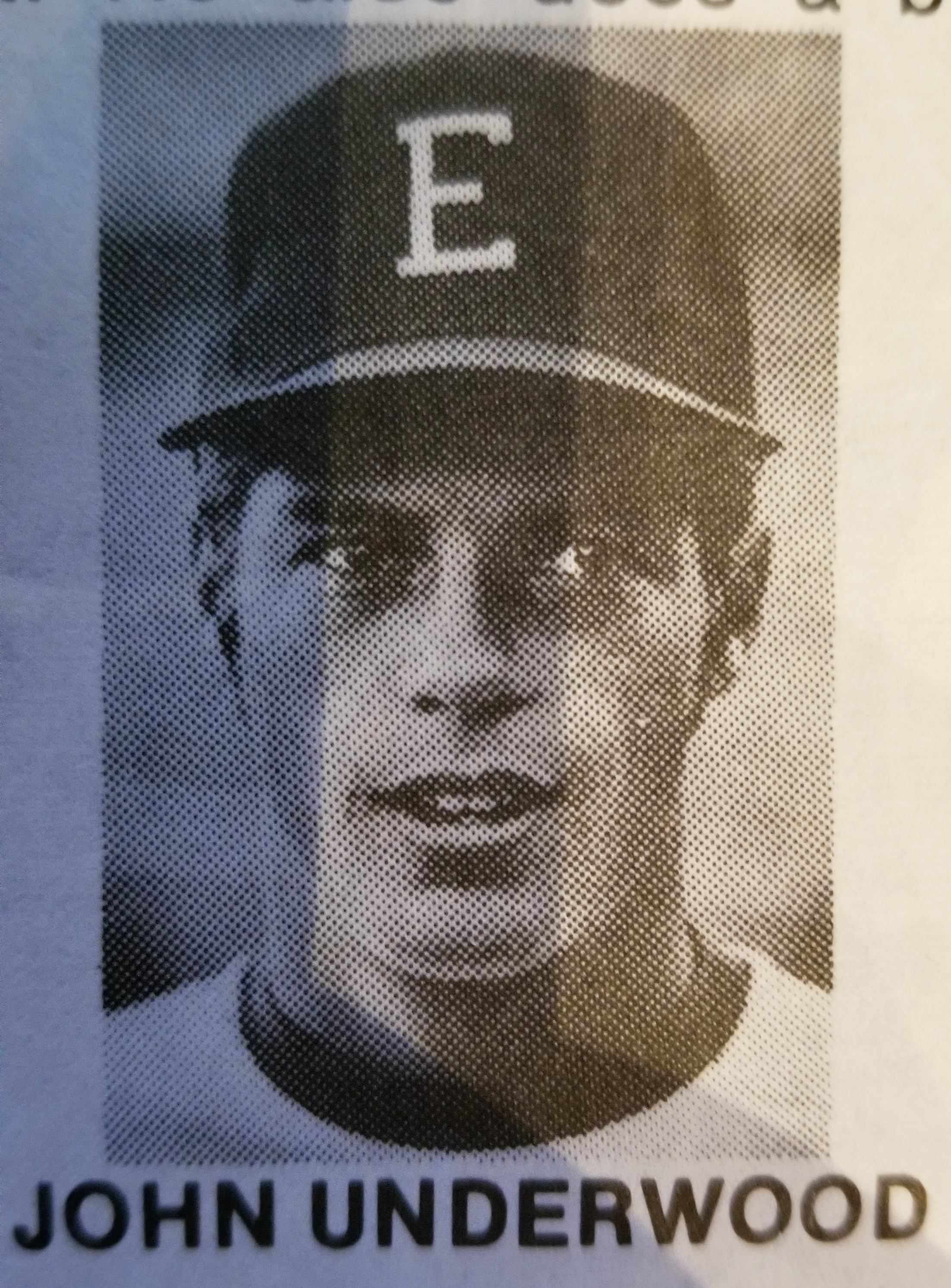
JH From Covina?
JU Right. Royal High School in Covina, California.
JH Was baseball always your number-one sport, or were there others?
JU It definitely was the one I played most. I think I started at nine-years-old and made the All-Star team. Then I always played with older kids, and I did play a little bit of basketball, but I was a hack-and-foul guy, so they didn’t start me. I only played my freshman or sophomore year in high school. The coach said, I can’t start you, because you’ll get two fouls in the first two minutes! He’d wait about four or five minutes and then he’d bring me in. I’d get my three fouls or something like that, and then that would be about it.
I played some football in high school. And actually I broke a bone in my neck when I was in a senior. So that came up pretty short, but I mostly spent time playing baseball.
JH Were you always a pitcher, or were you the guy who was the best athlete and played short and hit third?
JU I did pitch often, and I was a pretty good fielder. I made all-whatever as a third-baseman in Southern California. And I kinda thought I’d get drafted as an infielder. But Larry Barton Jr. was a main scout for the Reds at that time. And one of the high-school coaches, Steve Gruwell, had seen me through the years. And so he’s the one that ended up saying, Hey, we’re going to draft you as a pitcher. So that’s kind of what happened there.
JH And your arm problems started pretty early on after you got drafted?
JU Yeah. I threw a — I think the verbiage back then was a slurve [cross between a slider and a curve]. And I was trying to be taught a little better mechanics, and it always bothered my arm. Cause I probably didn’t have the best mechanics, you know, being an infielder. You’re throwing from different angles and stuff, and I had a good arm.
I never worked with a pitching guy, although my high-school coach was a pitcher. But you don’t have that much time to spend [on individual players] in high school. You’re alone, the only coach there is, and you can only do so much.
And so my mechanics changed a lot when I got in the Reds organization. I think maybe the combination of learning a little more mechanics and trying to throw more breaking balls [hurt my arm].
It was kind of a rough [rookie] year. I ended up having surgery after that year, so my arm was not doing too good. And you got a guy who basically could only throw a fastball and had to learn something else, because the breaking ball was killing me.
[There were] a lot of college guys in that era, in the Gulf Coast League. But it was a great learning experience, because I had some good people around me.
You know, you’re an 18-year-old kid and the best thing you got is a moving fastball and not too much other stuff. I had a good changeup and it got better and better, but you know, I had to sort of throw that breaking ball enough, otherwise it was trouble. So I think it bothered me enough then, and I wasn’t used to throwing out of the bullpen too much, either.
much other stuff. I had a good changeup and it got better and better, but you know, I had to sort of throw that breaking ball enough, otherwise it was trouble. So I think it bothered me enough then, and I wasn’t used to throwing out of the bullpen too much, either.
JH Was that during the time that a lot of guys hurt their arms throwing sliders?
JU Yeah, sliders and curve balls, really. I think it’s even more nowadays; I can’t believe how many arm injuries there are.
JH It’s pretty astounding.
JU It is, and I attribute that to a lot of them playing just baseball, and they’re throwing breaking balls at young ages, and it’s ridiculous.
The parents all think they’re gonna have a kid who’s going to get drafted, or at least play in major-college baseball. That’s a good goal to have, but the reality is pretty minimal.
JH And that was the time anyway, when so many people — especially in the Dodgers system — were antislider, because so many guys did hurt their arms.
JU Yeah. I tried to throw the slider, but I think you’re supposed to just have it come off the hand a certain way. And I had a tendency to try to — the slurve is trying to throw a curve ball and a slider kind of same thing, and you do a twist of the wrist. It was hard on the arm. There’s no question about that.
JH So you didn’t go for that theory that you throw a slider like you throw a football?
JU I tried at the end, but I think it actually bothered my arm as much as anything else to do that. So that’s really why I ended up throwing that changeup more like a screwball. I mean, between two-seam, four-seam, and throwing the changeup that was going like a screwball, I might only throw maybe 10 curve balls out of the 100 pitches I threw, or 85 or something. Just to show it once in a while.

I probably threw in the high 80s at the best. But the changeup moved a lot. So I threw that probably 40 percent of the time.
JH What kind of a changeup was it?
JU It was a circle change.
JH And that’s what Soto had also, wasn’t it?
JU Yeah, I gotta take part of the credit for that.
JH Did he have that then, or was it something he developed later?
JU I worked with Scott Breeden, because I had Mario in Extended Spring, and he had come off an arm injury, and he threw a pretty hard slider. That was tougher on the arm, so we taught him — I worked with him a lot on that same changeup in 1976.
Well, he picked it up fast. Real fast. But it was Scott Breeden and myself working with him. And you saw what he could do. He would throw 94, 96, and the changeup would be 87. Enough of a difference. Mine would have been like 77 [laughs].
JH But still effective; I mean, you got guys out!
JU Yep! In to the righthanders, or try to put it on the outside, or bust somebody in.
JH If your background was as a starter and your experience was as a starter, what led them to make you a reliever, it seemed like right away? You had 13 appearances, but only one start, your rookie year.
JU I think because there was so many guys drafted who really had come out of college. There were more starters, and I was more of a utility guy. And so I think they probably figured out what’s going to best fit him? And after they figured that my arm wasn’t good enough, that I had struggled as being a reliever, they said, between all the coaches and stuff, well, I think this guy can be a starter. He throws enough strikes. He makes guys get contact, that kind of thing. So I think that’s where it kind of evolved.
JH Because after the first year, you did start pretty much, until the last year you played.
JU Yeah, I was in the rotation.
JH Then in 1974, you have a 4-1, 2.20 ERA in eight games. Was your arm still recovering at that point?
JU Yeah, I had surgery after 1973. I had been recovering, and I was at Extended Spring before going up to Seattle, and so I had some games where – I can’t remember when I joined the team – maybe early July.
JH Must have been, because there were just eight games, and they were all starts.
JU Yeah, that makes sense.
JH Was it elbow or shoulder?
JU Elbow. One on the inside, one on the outside. I had it operated on in early 1974 and also in 1976.
JH I did kind of wonder, because in 1976, all the appearances are in relief. And it’s just such a difference. I looked at that and thought, he must have been hurt.
JU Yeah. I was a player-coach for Greg Riddoch that year.
After the 1975 season, I go into AAA at spring training, throwing there, and hurt it then. And then I’m just recovering again. So I’m helping Greg out with the experience on the team, and so I basically came in when the shit was hitting the fan. I think I had maybe 12 innings I pitched or something – 11 appearances.
JH 11 appearances in 1976.
JU Yeah, that was all relief – put me in when the shit’s hitting the fan; I’ll try to do what I can to mop up. And the ERA was kind of high that year.
JH 7.50, but consider the circumstances. In 1975 with Tampa and Eugene combined, that’s 8-4, and that’s a pretty good year. Was that a callup situation? That your arm was healthy again?
JU No, I got hurt again. I started the second game at Tampa, was doing well and screwed it up again. So they decided to send me back to St. Pete and try to rehab myself. I think I played probably April, the first part of May, then I was off like five or six, seven weeks, rehabbing.
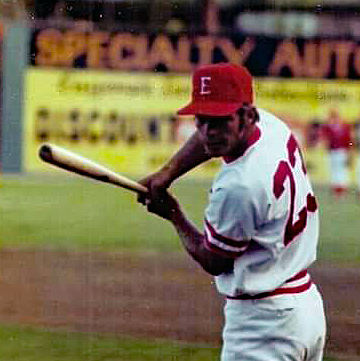
I flew in [to Eugene] and met the ballclub – I think it was the same day Paul Moskau and I showed up – in Seattle. And there was a doubleheader, and we won both of them, so that team, we won 42 games and lost 18 after that.
JH For Eugene, were you considered the number-two starter behind Moskau?
JU Well, certainly in the playoffs, it was that way. I think when I came up [to Eugene] again, I had been doing rehab down in St. Pete, and they probably keep me as a third or fourth guy. I might’ve taken Mario Soto’s spot, because he had a bad elbow or something that year.
The Portland Mavericks were the Ems’ biggest rivals. The Mavericks’ freewheeling style and appearance was in direct contrast to the button-down image the Emeralds presented as a Reds farm team. It was fitting that the polar-opposites met for the 1975 Northwest League championship.
JH Was it just a general thing that the Eugene club was pretty well antiPortland?
JU Yeah. I mean, you had the guys that had been in the league before — you got Barry Moss and John Harrison and Luke, and George — they all played against them.
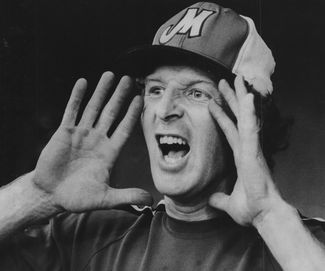
You know, [Portland was] older guys, and they were just cocky. And you’ve got [owner] Bing Russell, who was his own type of guy, and he didn’t hold back punches, and [manager] Frank Peters. And some of the players were pretty outspoken. Most of them actually were probably pretty good guys.
Have you seen The Battered Bastards of Baseball? [Netflix documentary about the Mavericks.]
JH Yes, several times. And the expression I’ve heard more than once from your  teammates is, well, you know, it’s funny. They don’t mention us very much in that documentary, because we kicked their asses!
teammates is, well, you know, it’s funny. They don’t mention us very much in that documentary, because we kicked their asses!
JU Yeah. I think we had their number pretty well. We lost a couple of games to them, but if we played them 10 times, we probably beat them seven or eight.
The Ems were 10-5 against Portland in 1975; They lost four of the first five games, then beat them nine of ten games down the stretch.
JU Funny, they don’t mention the 1975 Ems in [BBofB]. We kicked their ass, that’s why! But we should’ve been in it!
And Moskau pitched the first game against Jim Bouton, and then I pitched the second 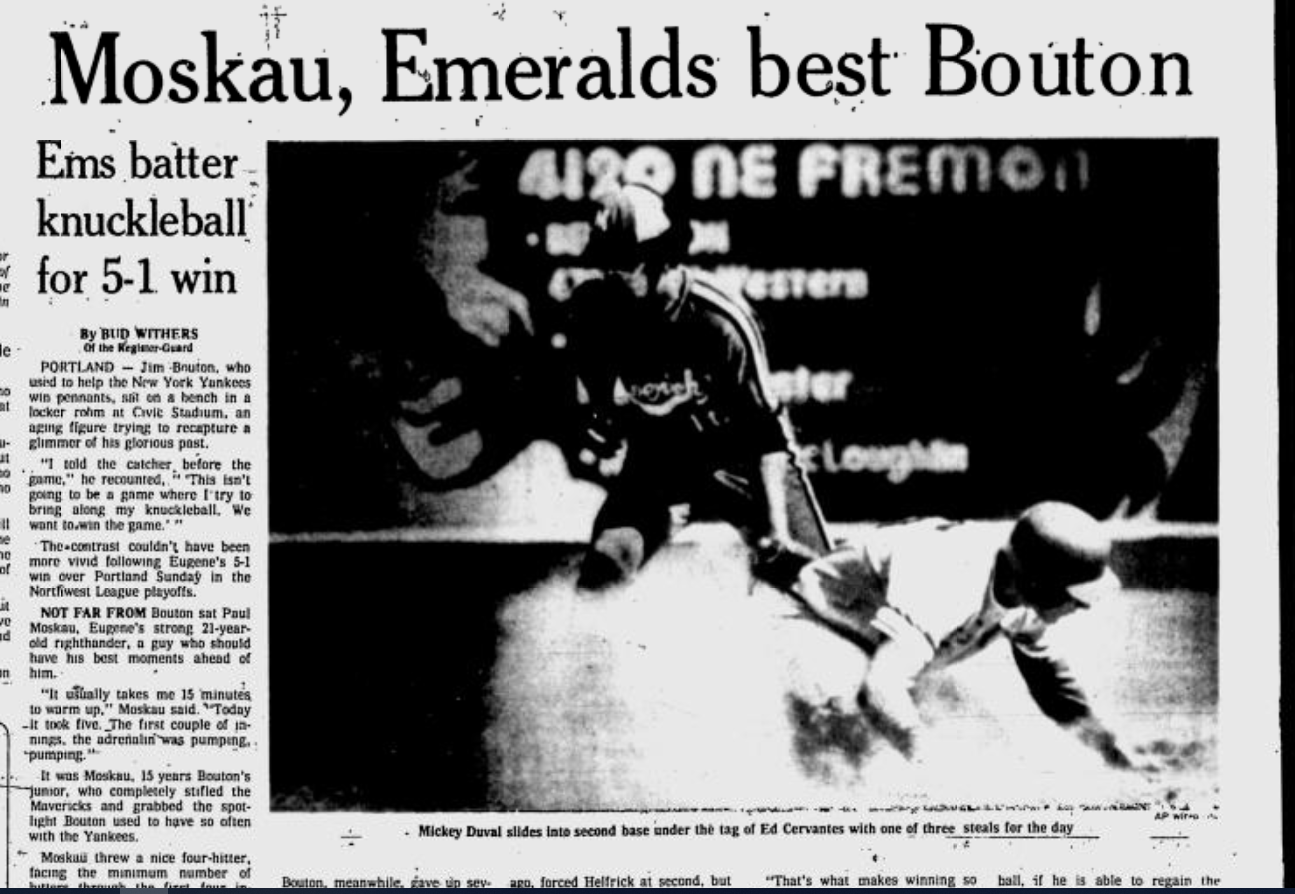 game, because two out of three is all it was, and it was interesting, but we weren’t even mentioned in that [BBofB].
game, because two out of three is all it was, and it was interesting, but we weren’t even mentioned in that [BBofB].
JH It seems like the biggest bone that people have to pick is with Peters, more than the rest of the guys.
JU I think he allowed a lot of the stuff to happen.
JH It’s funny that Peters calls himself The Flake, and in the championship-game story, you call yourself a flake. We’re all flakes! you said.
JU Yeah, yeah. A little different. I mean, my personality was probably a little different. Kind of a carefree guy. I think if somebody asked a question about me, they’d probably say he was pretty easygoing guy. I got along with pretty much everybody.
I think I was probably maybe number-three when Paul got there. I think at the point where — because I had enough success, Greg just said, Hey, I’m going to have you start in the second game for us against Portland.
Greg Riddoch, on his decision to pitch Underwood in that game: He’s got the most experience. He’s the most-polished pitcher.
John pitched a tremendous game for Eugene, going the distance and shutting out Portland 1-0, clinching the Emeralds’ second-consecutive Northwest League championship.
JH Let’s talk about the championship game, and the fact that you did come up number-two in the rotation. Were there other possibilities? Were you surprised at all about starting the second game?
JU I don’t think I was surprised. I think I was just more like, Hey, good, good. I was honored to do it. I’ll tell you what, the guys like Barry Moss and Bill Bird, I was close to those guys. And they gave me so much confidence, because I knew they loved playing behind me when I was pitching. I didn’t mess around, and so they were always on their toes. They just gave a lot of confidence to me. You know, you can do it, you can do it type of thing.
Riddoch: He was that kind of a guy. Great personality, and elite competitor.
JH Reading the story from the championship game, one of the quotes was, I didn’t get shook up at any time. I’m not a nervous pitcher. That’s a pretty good attribute to have when you’re pitching for a championship.
JU Exactly. It wasn’t a long, drawn-out game. It didn’t take long.
JH Something like an hour and 50 minutes.
JU Yeah. When I had a complete game, most of them were probably under two hours and 10 minutes, two hours and 15 minutes.
JH And they had 14 fly-ball outs in that game. What do you attribute to? Is that them trying to play “hero ball”? Is that you keeping the ball away from them?
JU Probably location, and probably a little deception, maybe. I moved the ball around enough and that changeup was enough that maybe when it’s time to say, Oh, there’s a fastball. And it just — the motion was similar — it’s like, Oh, okay. And so they just miss it, type of thing.
JH Get them reaching just a little bit, maybe, or out in front a little bit?
JU A little bit high and, you know, didn’t get enough meat on it.
JH So they would call you “pitching to contact” these days.
JU Yeah. I mean, that was the whole idea. The key to the game was keeping guys off base. And when they did have a couple of guys on base, the plays were made behind me, or I got the guy to pop up or fly out.
Riddoch: John Underwood was probably the toughest competitor on our team, with his head and his knowledge of reading hitters’ swings and how to keep people off balance and changing speeds.
JH Something else that I guess you would not probably see today, going back to the championship game, is that you threw a complete game — nobody else came in for you, even after they got a guy on in the ninth inning.
JU Interesting that you mentioned that. And I think I’d thrown something like five complete games that year. They felt comfortable to keep me in there, because we could have brought in somebody else, you know?
JH But it’s amazing how different the game was then. And he had enough confidence in you and didn’t just either automatically put a closer in, in the ninth — or as soon as somebody got on base, you were out of the game.
John Helfrich singled with one out, but then you got Steve Lackey on a fly ball to center field and Rich Meily hit a two-hopper to Lucich at first. And that was it.
I give Greg a lot of — you know, he had a lot of confidence. That’s what he did. He’s just amazing. Greg was able to say, Hey, you’re good enough to do this. You know, keep confidence in yourself. You can play, you know.
Riddoch: I didn’t have anybody up for that [ninth inning]. I was going to win the game or lose the game with him. Now, you know what kind of confidence that gives him?
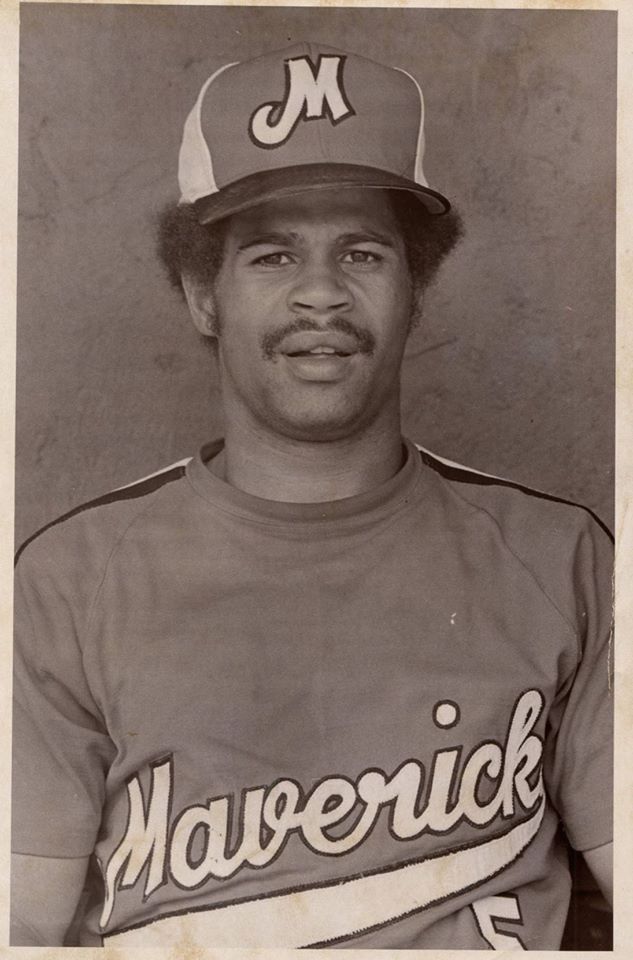
In the seventh inning of the championship game, the Mavericks’ Reggie Thomas got a base hit and tried to steal second base. But catcher Marlon Styles threw him out to end that threat.
JU Reggie Thomas was on base, and he was fast — he got on twice. But Marlon Styles threw him out. I had a pretty good move; I could keep them pretty close. And everything just goes perfect. You throw the fastball a little bit to the outside. And he comes up, throws, and boom!
JH So many pitchers have said that Marlon was the heart-and-soul of the team, and they enjoyed throwing to him so much. What made him special for you?
JU The target he set was awesome. He was sort of a short, smaller guy. He held the glove in the right spots, but he gave you so much confidence and he took control of the whole thing. His voice was — you could hear him half-a-mile away, easy. And he just was fun to throw to. He just exuded the confidence. Hey, we got this.
We played together in Bradenton. So I was with him most of three years. So he would come down and says, okay. Cause he knew what I had and didn’t have. He says, let’s mess with guys.
He’d say, I’m going to put down the fastball, but shake your head “no.” And then the thinking is, okay, now the guy doesn’t know — what pitch did I just shake off? You don’t see that too often.
And so that was the beginning of saying, well, yeah, he knows what he’s doing. He watches the hitters, he watches their tendencies, you know, he studied guys. And so then he gives you the confidence that we can do this. Here’s how we’re going to do on this guy.
JH So he got in their heads, and you kind of went against tendencies with a fake-shake and that kind of thing.
JU Yeah. Okay, do it again. And then: let’s throw that fastball or let’s throw that changeup three times in a row.
Riddoch: What I called it is ‘two brains equal one.’ That sounds goofy; it’s just my own term. But when you get two brains thinking as one, and you see a pitcher make a pitch and the catcher kind of point to him and throw the ball back, like, ‘yes!’ their brains are
As a manager or coach, you need to just stay the hell out of the way and let them go do their thing. — Greg Riddoch
thinking as one brain. And two brains are a lot smarter than one. And when Underwood was pitching and Marlon was catching, they were so ‘on’ to all of that stuff, they were thinking almost exactly alike. And as a manager or coach, you need to just stay the hell out of the way and let them go do their thing.
JH Greg has talked a lot about how tight that team was, and how everybody was pulling the same direction.
JU Yeah, by far it was unique. On that team there were three other guys who started [for Eugene] in 1973, so we knew each other, and we kind of had a little base.
And in that 2-1/2 months, there was enough of a mixture of guys coming from experienced team, getting drafted, playing good college ball, playing a couple years of pro sports. Extremely talented group. And nobody was like, a showboat; nobody was – everybody pulled for [each other].
It was an amazing thing to watch how the guys would react when – never panicked, I guess, you know? It was always something that they believed we could win every time we went out there, because there were some pretty good guys on that team.
JH Yeah, and it ranges in age from 18 to 24. For that league, that’s quite an age span.
JU Right. McPherson – who’s a good buddy of mine today – and Lucich were 24. And Rothschild, I think he’s still with the Yankees, unless he’s done.
JH Several guys have said that it was such a good and unique experience because there wasn’t the pissiness and the egos and —
JU Everybody supported each other. Even the guys that didn’t get to play much. Nobody’s like, Oh, I’m not playing. It was more like, Hey, we’re all into this thing together. And Greg was really good about that part of it too. Everybody needs some time; they need to play. And you know, we had enough variety of guys that — injuries came upon us.
Bill Bird took one in the face on a runner going to second. Marlon’s throw short-hopped him, and it took out some teeth. So he didn’t get to play for two or three weeks. He was in bad shape, man.
JH So many times it seems like in minor-league or independent ball, you have a 25-man roster and they’re all out to feather their own nests. There isn’t really a team concept, so to speak. But that seemed to have all gone out the window in Eugene.
JU Yeah, exactly. There were guys who had been drafted, like Rothschild and Moskau and some of the other guys. And then the guys like Harrison or me and Moss and Marlon and Bird and Watkins. We’d played several years together. Barry and George and Luke [Lucich] and Harrison were on the 1974 team. We played against them, but in spring training, it was just, hey, you respected each other and now we’re all playing together, you know?
And we’ve become extremely close as friends. Moskau, myself, Mario Soto, George McPherson, Barry Moss, my good friend Bill Bird, we’re extremely close and communicate many times during the year.
JH That’s really something, for all these years to have passed, and you guys are still that tight. That really speaks to what went on in those days.
JU Exactly. This group is extremely tight. George McPherson and I roomed for four different years. I managed Eugene in 1977, and George was my player-coach; he and I roomed when I was managing, Then he took off and played AAA the last few weeks of the season.
JH Greg did stress, and it’s unusual, to get into a situation at that level of ball, where the guys really are a team and do the things it takes to win, and not just be all about “what can I do to advance?”
JU Exactly. And one of the things back then: the guys were taught how to do The Reds Way of playing baseball, which was extremely important. Because everybody – no matter where you went, A, AA, AAA – it would change when you would get up to Sparky, but the communication words were all the same. Obviously the signs were different, indicators – but everybody taught the same way.
In fact, in spring training, the Reds brought in some new people, and they tried to do it like The Dodger Way or some Other Way, and the field coordinator at the time, Ron Plaza, he’d come flying down from up top, ripping guys’ asses, because that’s not how we do it here!
JH Imagine! Ron Plaza ripping somebody a new ass!
JU Well, I married one of his daughters! He was my father-in-law for several years, and my first manager. So –
JH I bet you toed the line pretty good then, huh! [laughter]
JU Yeah, yeah. There was a time, I – one of the games I pitched relief, it was toward the end of the season the first year, and I just got ripped; I think I gave up seven runs. I just couldn’t get anybody out.
So end of the inning, I walk off; I go into the clubhouse at Bradenton without going to the bench. And the game’s over, and oh, my God, we had the scouting people: Rex Bowen, and George Zuraw. Plaza’s yelling at me, throwing chairs and shit – it was interesting.
JH I bet it was! You got it from both sides: you’re dating his daughter, and you’re playing for him? Wow! That’s rough! That’s almost cruel-and-unusual, there! That is true love!
JU Yeah! But later, we got married.
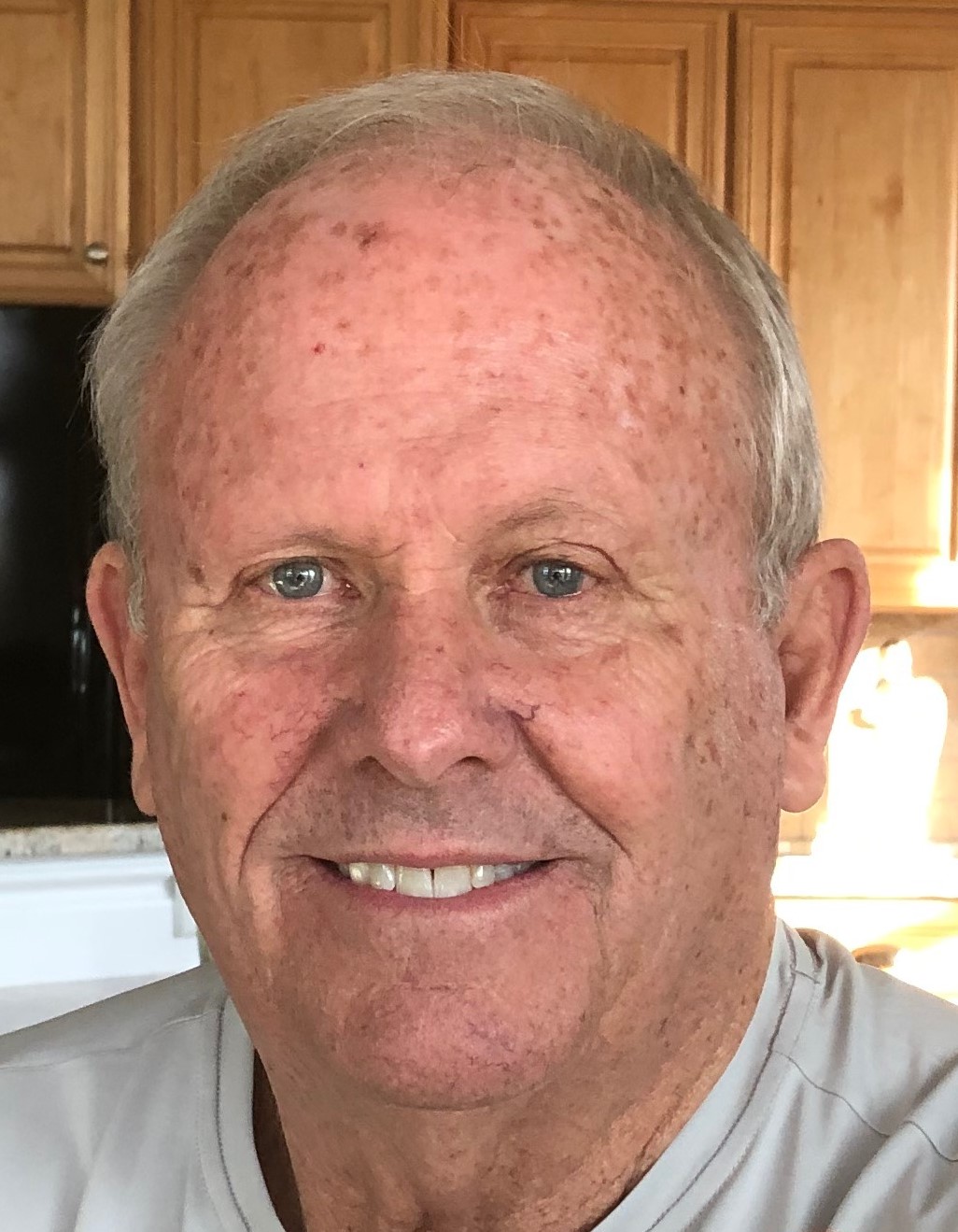
JH What do you think was Greg’s strongest point as a manager? Was it how he was able to “read” people and motivate them?
JU Yeah. That, and he is just enough of a character enough to have fun. But when the shit hit the fan, he could make it hit and then it’s over; let’s move on, you know?
And had that way of knowing each individual guy and kind of what got him motivated, probably knowing the limitations: how do we help this guy? How do I reach them to do this — to get the best out of them?
And Greg had a saying: you know, every day you get up and you’re looking in the mirror. And you look at yourself and you know if you do your best, or you didn’t do your best or didn’t try, or you did something that wasn’t right. You look yourself in the eye and you can, hey, I did something stupid today or whatever.
And he said,
You’re the one that knows yourself. And you can’t hide from that.
And it’s like, well, you’re right. What a simple comment, but it’s true. Every day you look yourself in the eye and go, you know, I’m going to make a good day of it. Or I did the best I could. What a simple, positive thing that was, and something that meant — it’s hard to not to take that in and appreciate it.
He taught so many good lessons to all of us.
One of the things that was neat about Greg was, he knew how to read people, or at least, in a stressful situation, say, “screw it.” Take your mind off something, and not let it focus on what has to happen, but what you can do next to rectify some things.
So his style of coaching was not only funny, but his sense of humor was enough to make you relax and be able to perform really at the top – as natural as you could. The confidence was incredible.
He had a great way of making you the best player you could possibly be.
JH Would you say that the mental approach he had to things, and what he was able to instill in you guys — was that a stronger point for him than running the game, let’s say?
JU He knew the game very well. But he knew how to get the most out of each guy. He knew the strengths of each person, and he knew the personality. He knew that I was more of a flaky kind of guy, with a decent amount of talent, but I probably got as much as I could out of what I had, with the issues I had with my arm.
JH And so you battled and battled arm problems, finally ended up being a player-coach for a year, and then a manager?
JU In 1976 in a spring-training game, I think I threw a breaking ball and that boom! that was it. And then I just it’s like, I can’t pitch anymore. I did rehab again, but they said, you know what? Why don’t you just take it easy? Let’s try to do a little rehab.
JU And so I just went as a player-coach for Greg and I still struggled with it. It was still hurting. I only went in [to pitch] when I had to. And so my ERA was pretty high and I only probably pitched in seven, eight games.
JH How do you become a manager at 22 years old? Was the arm just completely shot by then, and they said, look, this is the only way you can stay in the game?
JU Back in spring training again, and I’m with the AAA club after trying to recover, and in a spring-training game, and I throw a breaking ball to a guy who’s with Philadelphia, and it just gave up the ship. So I figured I was done, and Marc Bombard said, you got a lot of good knowledge, and you got stuff you can hand back.
At that time I was close to Plaza, and Scotty Breeden, who was a pitching coach, and they just said, go talk to Chief Bender. And I think it just came out that they needed a manager in Eugene. I don’t know who they were going to hire, but they didn’t have a lot of time, so we got together, and I accepted the job and went to Extended Spring, which in in St. Pete, as a 22-year-old manager.
I guess they thought I knew enough about the game to get by. It wasn’t the most winning season, but it was about .500. It was a hell of an experience, I’ll tell you that much.
JH To be 22 years old, and doing that?
JU I took a lot from Plaza; how Riddoch was; Jimmy Hoff, who just passed away. So you take all the different guys and the different personalities – even like a Brooks Lawrence, from back in 1973, our pitching instructor for the Reds.
As a kid, you just suck things up, and listen. And then I was able to impersonate some people pretty good.
JH Well, for a year, anyway! [laughter] Why was it for only one season?
JU After that season, I don’t know what happened, but they decided they couldn’t afford $1,200 a month for several of us. I was the youngest one of them being let go. The next year, in 1978, I was a traveling pitching instructor. That’s all I did, was a pitching instructor. Marc Bombard and myself were traveling pitching instructors. Jimmy Lett ended up becoming a manager.
JU And then at the end of the season, I’m in Seattle with that club and Chief Bender and Ron Plaza. We have a nice dinner up at the top of the top of the Space Needle in Seattle.
And on the way down, I get the old well, John, I got to tell you that we’re not going to have room for you next year.
And that was it. I went to work for a living.
JH Any regrets about how that part of your career turned out? I would assume you would have preferred to stay in the game.
JU I’m about ready to marry Ron Plaza’s daughter at the time. I got an “in” — I know a lot of the people in the organization. I think I got a great relationship. I thought for sure, I got to have a spot as a pitching coach or doing something. So it just happened to be bad timing. But it [got] to the point where you get the guys that have been in the big leagues for all the years and they started becoming coaches.
JH You got caught in a numbers game there.
JU Just like a lot of players did.
JH Sure. But I guess like your arm, you got about as much out of it as you could.
JU Yeah, I think so. Actually, some acupuncture and some of the rehab has helped [me to] live a normal life.
JH Did you ever feel like you got shortchanged because you were a lower-round pick? That old thing about the people with the bonuses — or the higher salaries to begin with — got preferential treatment?
JU No. Not one time, because I think for the most part, except for a few games that I got lit up, I think my results were enough to keep me in that [area of] the guy deserves to go here. He has a chance. We think he can go here, you know?
It depends on who you talk to. Somebody would say, you know, you probably would have maxed-out at AAA. I don’t doubt that. Someone else might say, no, you had the stuff you could have gotten to the big leagues. Well, maybe in another era. There weren’t too many 165-pound guys flinging out there in the big leagues.
JH I’m glad to know you feel like you got as much out of your own career as you could – that it was a physical limitation that stopped it for you.
JU A bunch of guys I came up with got to the big leagues and did real well, and I was competitive with them, when I was healthy.
JH It’s a shame that it’s devolved into such a power game on both sides of the ball now, that somebody like you might not even get a look – when all you did was get people out. Well, gee, he didn’t know overpower them.
But you took on the second-best team in the league and shut them out in the championship game. How about that?
JU I don’t have any sour – I got the best I could out of it, and friendships.
JH We talked about how tight that 1975 team was, and you won the league and the whole deal. Any other memorable stuff that you can recall from that season, on or off the field?
JU You can picture some of the road trips we would go on – in the Northwest League, you got some pretty good travel times, distances, but Greg would always make sure we had great bus drivers. We would take a break, and en route, time allowing, we’d stop at Yellowstone, or we’d stop somewhere in the falls in the northern part of Oregon, and enjoy – he would make sure that we would try to enjoy what we had in the area. The Northwest was phenomenal. He always tried to max the amount of fun, as well, with playing the game.
Walla Walla was [in] the Padres’ organization, and it was kind of like a football field converted to a partial baseball field. And the only place in town that we would stay was a restaurant-hotel – Black Angus – the rooms were pretty cool. Pretty decent place.
You get done late at night, and everybody showers, and you’re in close quarters with guys. The bus is pretty full, there’s one crapper in there. Some guys want to hear a little music; you know, we all liked kind of similar music at the time.
You had storage underneath the bus, but you had these little bay areas up above, and depending on whoever got there first was at least kind of able to lay flat. It was hard as shit, and you didn’t have a lot of room, but at least you could lay flat for a while.
And a lot of kids get homesick – those kids coming from the Dominican, or Puerto Rico, or Venezuela.
JH That’s a long way.
JU A long way, and they don’t know English, and so, that was probably as neat as anything, getting to know people in those lives, and their ways. I mean, Mario Soto, I fixed him his very first spaghetti dinner, for God’s sakes. He didn’t know what the hell it was!
When we had an off-day, we would do stuff as a team. Some guys might fish; some might have a barbecue somewhere. That was kind of a neat thing too, as opposed to OK, you got a day off, you guys just show up [for the next game]. There were some scheduled things, and the city engaged with us pretty good. And there were some people who would invite the guys over to their house for a barbecue and stuff. So it was neat to be able to have friends that were fans.
We pulled a lot of pranks on each other, but there were a lot of serious times. When you’re winning, things kind of get overlooked – but Greg kept it under control. He knew he was responsible for these guys’ lives, and their careers, and so there were some things that you really took advantage of, but you realize that he’s there doing stuff for the right way, and a joke is a joke, but OK, let’s get back to the real thing.
Another unique element of the 1975 season was the hiring of Christine Wren – one of the first female umpires. John is one of several Ems I talked to who thought she did a good job.
JU Back in Eugene, in the 1975 year in the Northwest League, an umpire, Christine Wren – I loved when she called my game. She gave me the close pitches; I was usually around the plate, [and] didn’t have an attitude. I wish she would have been behind the plate every game I pitched.
They had to dress in the same locker room and stuff. I think she left [a bra] in the locker room one time, and I think it was Riddoch came up to her and said, I got something of yours that you might want or something like that. It was pretty funny way he did it. But she took it in stride.
JH He did mention that. And months later, he managed to make a little presentation out of giving it back to her.
Forty-five years after their championship season, the 1975 Eugene Emeralds are still close-knit:
JU By 1975, I had already known a lot of those guys for a long time. And the time you spend together — on the field, off the field, you’re talking baseball, you’re talking about each other — they’re family. You just learn about the person, and it’s an education that is forever, and the friendship and the bonding, because you spend so much time with a lot of guys.
Nobody was butting heads with anybody, that I can remember; you know, it was just so strong. It was something that you can’t forget. And it was just an education and it was a blessing of a lifetime.
What luck did we have to know each other and grow up and have the respect we have for each other! And that’s part of the bond that we all have. We just learned about each other, and we’re all brothers and it’s an incredible thing to have.
I don’t know how many more times as a big group we’re going to get together, but certainly I know that for several of us, it’s not too far to drive up or fly to Denver, to see Greg. Or he can come down here or whatever. Nobody’s getting younger.
It seems like it was a month ago, sometimes. It really does.
But you know, I think about them all the time.

